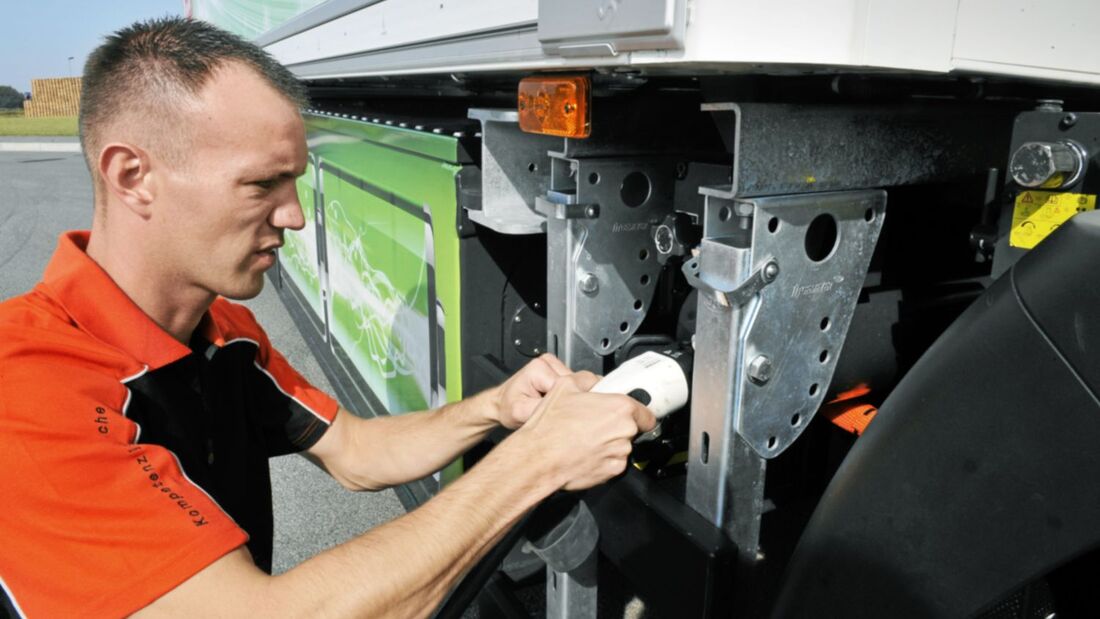Main topics, next to the current status and the potentials of this technology, also included barriers and trends. For Dr. Sebastian Stütz of Fraunhofer IML, electromobility isn't just about the replacement of one drive train by another. Experience has shown many starting points: from traffic jams over blue badges all the way to double-parking. What at first glance doesn't seem to have much to do with electromobility, actually belongs together. A traffic jam remains a traffic jam. Electromobility also isn't necessarily climate-friendly – for example when electricity is gained by incineration of lignite. Stütz recommends sharp penalties for double-parking of delivery trucks. Only then will alternative drives and delivery concepts actually pay off.
For not only is the range of e-trucks fragmentary so far, the vehicles are furthermore double or triple the prices of the diesel counterpart. Since this involves modifications and not series production vehicles, "especially mid-size companies are left without a service network," Stütz reported.
Project GeNaLog deals with overnight logistics
In his opinion, the problem is that a series production vehicle of the 7.5-ton class is necessary. And it needs a cheap electricity rate – always in comparison to diesel fuel prices. In addition, it's up to politics to create business models especially for e-trucks. "Why, for example, do you have to pay an EEG-levy when using an e-truck?" Furthermore, it takes eight years to emerge at nil-nil, according to his calculations. "But that may strongly vary depending on which electricity- or diesel fuel price is used as a basis," Stütz explained. Likewise included in considerations must be the fact that cities like Paris and Madrid ban diesel fuel vehicles. This puts manufacturers of commercial vehicles under pressure.
Yet, in Stütz's opinion, exchanging diesel trucks with e-trucks only makes limited sense. A suitable e-concept would be better. For example the use of street scooters in city centers. Which, on the other hand, entails a certain effort. 10 to 15 bikes are needed to transport a truckload. The benefit, "heretically stated", would come by saving on fines for double-parking. Furthermore, new business models through electromobility are conceivable, as for example the use of delivery robots. Birgit Heitzer, Head of Logistics at the REWE Group, offers a different approach. She introduced project GeNaLog, which concentrates on overnight logistics as an alternative for inner city logistics – in cooperation with electromobility. The reason for this project is the overloaded infrastructure in city centers.
The last mile is the most expensive of the entire transport process
"We experience this every day," Heitzer said. But the product availability especially in regard to the REWE-subsidiaries' opening hours from 7 am to 10 pm, in some cases even to 12 pm, is also important. Yet project GeNaLog isn't just about e-vehicles (in that case, an E-Force One truck was used) for deliveries, changes also need to be made in the subsidiary. The overnight delivery especially requires citizens' approval – and that of employees. That takes it as far as redesigned roll containers that make less noise on cobblestones. At this point, as well as with the vehicles, it's important to keep to the noise threshold. That seems to be a success. In the five-week test period, during which REWE specifically set up a complaint hotline, there were only two calls.
And the callers only wanted to know what REWE was testing. Heitzer recommended the development of a seal of approval "Quiet Logistics". This could help ease formalities for admissions for cities and municipalities. Responsibilities are furthermore regulated in completely different ways throughout the government agencies, depending on their location, which doesn't exactly facilitate such an undertaking. According to Markus Schell, Managing Partner at component manufacturer BPW Bergische Achsen, "the last mile is the most expensive in the entire transport process". Which is why the question what cities will look like in 2030 needs to be posed today. BPW got together with scientists, city planners and also KEP-service providers to get to the bottom of this. The one thing that is certain is that society is changing and the online trade is growing.
E-transport installed in crash-proof space
But urbanization is also advancing, in addition to digitization and the Internet of Transport (IoT), as BPW calls it. Because shopping in cities will continue to exist as a shopping experience. The difference will be that nobody leaves the store carrying shopping bags anymore. Schell drew a scenario with a regional hub, inner-city hub, as well as micro hubs for distribution. He sees vehicles with a permissible total weight from 3.5 to 18 tons – depending on their purpose – in cities themselves. They will have to be adapted to the process and therefore set up modularly. BPW also has a clear vision in regard to electric drives. Here, the people responsible are betting on wheel hub drives, sitting directly on the axle. A prototype of this solution already exists, christened E-Transport by BPW – a converted Mercedes Vario. Anything it doesn’t need was removed, including the cardan shaft.
"E-Transport was therefore installed in a crash-proof space and what's more, we managed to save weight," Schell explained. A shift in thinking and for vehicle construction must take place especially in electromobility, and everything must be scrutinized. As a resulting innovation he mentioned the so-called Torque Vectoring, which minimizes the turning circle. This depends on a controlled redistribution of drive torques to the left or right – depending on the turn.







